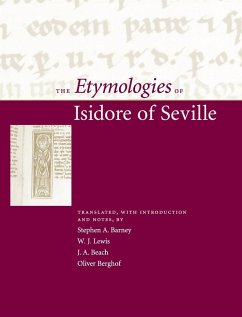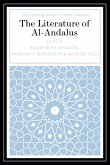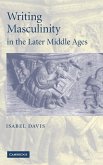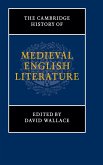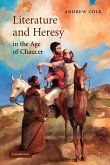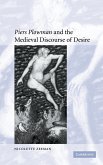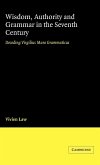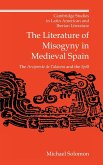Stephen A. Barney / W. J. Lewis / J. A. Beach / Oliver Berghof (eds.)
The Etymologies of Isidore of Seville
Herausgeber: Barney, Stephen. A.; Beach, J. A.; Lewis, W. J.
Stephen A. Barney / W. J. Lewis / J. A. Beach / Oliver Berghof (eds.)
The Etymologies of Isidore of Seville
Herausgeber: Barney, Stephen. A.; Beach, J. A.; Lewis, W. J.
- Gebundenes Buch
- Merkliste
- Auf die Merkliste
- Bewerten Bewerten
- Teilen
- Produkt teilen
- Produkterinnerung
- Produkterinnerung
The book gives the first complete English translation of the Etymologies of Isidore of Seville, the main resource of learning in the Middle Ages and early Renaissance. A fundamental repository of classical and early medieval knowledge, the Etymologies explores and examines hundreds of subjects, from the names of God to cooking utensils. This highly-readable translation of all twenty books of the Etymologies gives the student of late classical antiquity, medieval thought and the history of Western thought access to one of the key texts of the last one thousand years.
Andere Kunden interessierten sich auch für
![The Literature of Al-Andalus The Literature of Al-Andalus]() MarÃa Rosa Menocal / Raymond P. Scheindlin / Michael Sells (eds.)The Literature of Al-Andalus110,99 €
MarÃa Rosa Menocal / Raymond P. Scheindlin / Michael Sells (eds.)The Literature of Al-Andalus110,99 €![Writing Masculinity in the Later Middle Ages Writing Masculinity in the Later Middle Ages]() Isabel DavisWriting Masculinity in the Later Middle Ages66,99 €
Isabel DavisWriting Masculinity in the Later Middle Ages66,99 €![The Cambridge History of Medieval English Literature The Cambridge History of Medieval English Literature]() David Wallace (ed.)The Cambridge History of Medieval English Literature123,99 €
David Wallace (ed.)The Cambridge History of Medieval English Literature123,99 €![Literature and Heresy in the Age of Chaucer Literature and Heresy in the Age of Chaucer]() Andrew ColeLiterature and Heresy in the Age of Chaucer45,99 €
Andrew ColeLiterature and Heresy in the Age of Chaucer45,99 €!['Piers Plowman' and the Medieval Discourse of Desire 'Piers Plowman' and the Medieval Discourse of Desire]() Nicolette Zeeman'Piers Plowman' and the Medieval Discourse of Desire129,99 €
Nicolette Zeeman'Piers Plowman' and the Medieval Discourse of Desire129,99 €![Wisdom, Authority and Grammar in the Seventh Century Wisdom, Authority and Grammar in the Seventh Century]() V. LawWisdom, Authority and Grammar in the Seventh Century95,99 €
V. LawWisdom, Authority and Grammar in the Seventh Century95,99 €![The Literature of Misogyny in Medieval Spain The Literature of Misogyny in Medieval Spain]() Michael SolomonThe Literature of Misogyny in Medieval Spain129,99 €
Michael SolomonThe Literature of Misogyny in Medieval Spain129,99 €-
-
-
The book gives the first complete English translation of the Etymologies of Isidore of Seville, the main resource of learning in the Middle Ages and early Renaissance. A fundamental repository of classical and early medieval knowledge, the Etymologies explores and examines hundreds of subjects, from the names of God to cooking utensils. This highly-readable translation of all twenty books of the Etymologies gives the student of late classical antiquity, medieval thought and the history of Western thought access to one of the key texts of the last one thousand years.
Hinweis: Dieser Artikel kann nur an eine deutsche Lieferadresse ausgeliefert werden.
Hinweis: Dieser Artikel kann nur an eine deutsche Lieferadresse ausgeliefert werden.
Produktdetails
- Produktdetails
- Verlag: Cambridge University Press
- Seitenzahl: 490
- Erscheinungstermin: 24. August 2018
- Englisch
- Abmessung: 260mm x 208mm x 31mm
- Gewicht: 1263g
- ISBN-13: 9780521837491
- ISBN-10: 0521837499
- Artikelnr.: 21195108
- Herstellerkennzeichnung
- Libri GmbH
- Europaallee 1
- 36244 Bad Hersfeld
- gpsr@libri.de
- Verlag: Cambridge University Press
- Seitenzahl: 490
- Erscheinungstermin: 24. August 2018
- Englisch
- Abmessung: 260mm x 208mm x 31mm
- Gewicht: 1263g
- ISBN-13: 9780521837491
- ISBN-10: 0521837499
- Artikelnr.: 21195108
- Herstellerkennzeichnung
- Libri GmbH
- Europaallee 1
- 36244 Bad Hersfeld
- gpsr@libri.de
Stephen A. Barney is Emeritus Professor of English at the University of California, Irvine. He edited and annotated Chaucer's Troilus for The Riverside Chaucer (Houghton Mifflin,1987), and among his books are Word-Hoard (Yale University Press, 1977), Allegories of History, Allegories of Love (Archon, 1978), Studies in Troilus (Colleagues, 1993), and A Commentary on 'Piers Plowman' (University of Pennsylvania Press, forthcoming).
W. J. Lewis is a translator and editor. Her previous translations include two works by Galen: Hippocrates on the Nature of Man and On the Elements According to Hippocrates and she co-translated On the Properties of Discourse: A Translation of Tractatus de Proprietatibus Sermonum with Stephen Barney, Calvin Normore and Terence Parsons (1997).
Jennifer Beach is an independent Classics scholar and senior documenter for a software engineering company. She worked for several years at the Thesaurus Linguae Graecae and continues to explore the relationship between Classics and computer technology.
Oliver Berghof is Associate Professor of Comparative Literature at California State University, San Marcos and lecturer in humanities at University of California, Irvine. His previous publications include Georg Forster: A Voyage Round the World (ed. with Nicholas Thomas) (University of Hawai'i Press, 2000).
W. J. Lewis is a translator and editor. Her previous translations include two works by Galen: Hippocrates on the Nature of Man and On the Elements According to Hippocrates and she co-translated On the Properties of Discourse: A Translation of Tractatus de Proprietatibus Sermonum with Stephen Barney, Calvin Normore and Terence Parsons (1997).
Jennifer Beach is an independent Classics scholar and senior documenter for a software engineering company. She worked for several years at the Thesaurus Linguae Graecae and continues to explore the relationship between Classics and computer technology.
Oliver Berghof is Associate Professor of Comparative Literature at California State University, San Marcos and lecturer in humanities at University of California, Irvine. His previous publications include Georg Forster: A Voyage Round the World (ed. with Nicholas Thomas) (University of Hawai'i Press, 2000).
Introduction; Correspondence of Isidore and Braulio; The Etymologies: I: Grammar and its parts; II. Rhetoric and dialectic; III. Mathematics
whose parts are arithmetic
music
geometry
and astronomy; IV. Medicine; V. Laws and the instruments of the judiciary
and chronology; VI. The order of scripture
cycles and canons
liturgical feasts and offices; VII. Gods and angels
prophetic nomenclature
names of the holy fathers
martyrs
clerics
monks
and other names; VIII. Church and synagogue
religion and faith
heresies
philosophers
poets
sibyls
magicians
pagans
gods of the gentiles; IX. Languages of the nations
royal
military
and civic terminology
family relationships; X. Certain terms in alphabetical order; XI. Human beings and their parts
the ages of humans
portents and metamorphoses; XII. Four-footed animals
creeping animals
fish
and flying animals; XIII. Elements
that is
the heavens and the air
waters
the sea
rivers and floods; XIV. Earth
paradise
the regions of the whole globe
islands
mountains
other terms for places
and the lower regions of the earth; XV. Cities
urban and rural buildings
fields
boundaries and measures of fields
roads; XVI. Earthly materials from land and water
every kind of gem and precious stones
ivory likewise
treated along with marble
glass
all the metals
weights and measures; XVII. Agriculture
crops of every kind
vines and trees of every kind
herbs and all vegetables; XVIII. Wars and triumphs and the instruments of war
the forum
spectacles
games of chance and ball games; XIX. Ships
ropes
and nets
iron workers
the construction of walls and all the implements of building
also wool-working
ornaments
and all kinds of clothing; XX. Tables
foodstuffs
drink
and their vessels
vessels for wine
water
and oil
vessels of cooks
bakers
and lamps
beds
chairs
vehicles
rural and garden implements
equestrian equipment.
whose parts are arithmetic
music
geometry
and astronomy; IV. Medicine; V. Laws and the instruments of the judiciary
and chronology; VI. The order of scripture
cycles and canons
liturgical feasts and offices; VII. Gods and angels
prophetic nomenclature
names of the holy fathers
martyrs
clerics
monks
and other names; VIII. Church and synagogue
religion and faith
heresies
philosophers
poets
sibyls
magicians
pagans
gods of the gentiles; IX. Languages of the nations
royal
military
and civic terminology
family relationships; X. Certain terms in alphabetical order; XI. Human beings and their parts
the ages of humans
portents and metamorphoses; XII. Four-footed animals
creeping animals
fish
and flying animals; XIII. Elements
that is
the heavens and the air
waters
the sea
rivers and floods; XIV. Earth
paradise
the regions of the whole globe
islands
mountains
other terms for places
and the lower regions of the earth; XV. Cities
urban and rural buildings
fields
boundaries and measures of fields
roads; XVI. Earthly materials from land and water
every kind of gem and precious stones
ivory likewise
treated along with marble
glass
all the metals
weights and measures; XVII. Agriculture
crops of every kind
vines and trees of every kind
herbs and all vegetables; XVIII. Wars and triumphs and the instruments of war
the forum
spectacles
games of chance and ball games; XIX. Ships
ropes
and nets
iron workers
the construction of walls and all the implements of building
also wool-working
ornaments
and all kinds of clothing; XX. Tables
foodstuffs
drink
and their vessels
vessels for wine
water
and oil
vessels of cooks
bakers
and lamps
beds
chairs
vehicles
rural and garden implements
equestrian equipment.
Introduction; Correspondence of Isidore and Braulio; The Etymologies: I: Grammar and its parts; II. Rhetoric and dialectic; III. Mathematics
whose parts are arithmetic
music
geometry
and astronomy; IV. Medicine; V. Laws and the instruments of the judiciary
and chronology; VI. The order of scripture
cycles and canons
liturgical feasts and offices; VII. Gods and angels
prophetic nomenclature
names of the holy fathers
martyrs
clerics
monks
and other names; VIII. Church and synagogue
religion and faith
heresies
philosophers
poets
sibyls
magicians
pagans
gods of the gentiles; IX. Languages of the nations
royal
military
and civic terminology
family relationships; X. Certain terms in alphabetical order; XI. Human beings and their parts
the ages of humans
portents and metamorphoses; XII. Four-footed animals
creeping animals
fish
and flying animals; XIII. Elements
that is
the heavens and the air
waters
the sea
rivers and floods; XIV. Earth
paradise
the regions of the whole globe
islands
mountains
other terms for places
and the lower regions of the earth; XV. Cities
urban and rural buildings
fields
boundaries and measures of fields
roads; XVI. Earthly materials from land and water
every kind of gem and precious stones
ivory likewise
treated along with marble
glass
all the metals
weights and measures; XVII. Agriculture
crops of every kind
vines and trees of every kind
herbs and all vegetables; XVIII. Wars and triumphs and the instruments of war
the forum
spectacles
games of chance and ball games; XIX. Ships
ropes
and nets
iron workers
the construction of walls and all the implements of building
also wool-working
ornaments
and all kinds of clothing; XX. Tables
foodstuffs
drink
and their vessels
vessels for wine
water
and oil
vessels of cooks
bakers
and lamps
beds
chairs
vehicles
rural and garden implements
equestrian equipment.
whose parts are arithmetic
music
geometry
and astronomy; IV. Medicine; V. Laws and the instruments of the judiciary
and chronology; VI. The order of scripture
cycles and canons
liturgical feasts and offices; VII. Gods and angels
prophetic nomenclature
names of the holy fathers
martyrs
clerics
monks
and other names; VIII. Church and synagogue
religion and faith
heresies
philosophers
poets
sibyls
magicians
pagans
gods of the gentiles; IX. Languages of the nations
royal
military
and civic terminology
family relationships; X. Certain terms in alphabetical order; XI. Human beings and their parts
the ages of humans
portents and metamorphoses; XII. Four-footed animals
creeping animals
fish
and flying animals; XIII. Elements
that is
the heavens and the air
waters
the sea
rivers and floods; XIV. Earth
paradise
the regions of the whole globe
islands
mountains
other terms for places
and the lower regions of the earth; XV. Cities
urban and rural buildings
fields
boundaries and measures of fields
roads; XVI. Earthly materials from land and water
every kind of gem and precious stones
ivory likewise
treated along with marble
glass
all the metals
weights and measures; XVII. Agriculture
crops of every kind
vines and trees of every kind
herbs and all vegetables; XVIII. Wars and triumphs and the instruments of war
the forum
spectacles
games of chance and ball games; XIX. Ships
ropes
and nets
iron workers
the construction of walls and all the implements of building
also wool-working
ornaments
and all kinds of clothing; XX. Tables
foodstuffs
drink
and their vessels
vessels for wine
water
and oil
vessels of cooks
bakers
and lamps
beds
chairs
vehicles
rural and garden implements
equestrian equipment.

